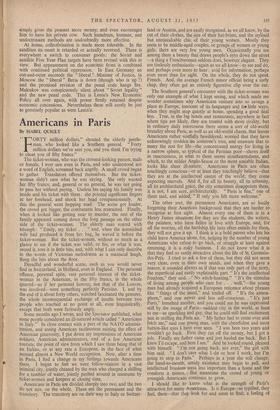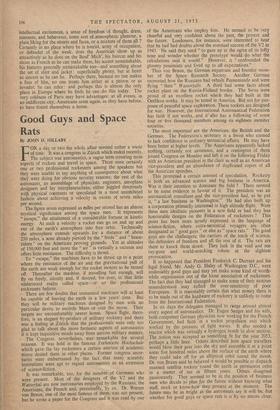Americans in Paris
By ISABEL QUIGLY " ORTY million dollars," shouted the elderly gentle- F man, who looked like a Southern general. " Forty million dollars we've sent you, and you think I'm trying to cheat you of fifty francs."
The ticket-woman, who was the crossest-looking person, male or female, I ever saw even in Paris, and who understood not a word of English, screamed back angrily. A small crowd began to gather. Translators offered themselves. But the ticket- woman didn't care what he was saying. She only wanted her fifty francs; and, general or no general, he was not going to pass her without paying. Useless his saying his family was inside and his ticket with them : she pointed significant fingers at her forehead, and shook her head compassionately. At this the general went hopping mad. The scene got louder, the crowd got bigger, the combatants less restrained. Finally, when it looked like getting near to murder, the rest of the family appeared coming down the Fong passage on the other side of the ticket-woman. The elderly man roared with triumph : " Emily, my ticket . . . " and, when the astonished wife had produced it from her bag, he waved 'it before the ticket-woman. But the ticket-woman, without so much as a glance to see if the ticket, was valid, or his, or what it was, seized it, tore it in little bits, and, with what I can only describe in the words of Victorian melodrama as a maniacal laugh, flung the bits about the floor. Dreadful and wonderful scene, such as you would never find in Switzerland, in Holland, even in England. The personal offence, personal spite, vast personal interest of the ticket- woman in' the American, in the fifty francs, in the whole quarrel—as if her personal honour, not that of the Louvre, was involved—were something perfectly Parisian. I, and by the end of it about forty others, watched fascinated the gestures, the whole inconsequential exchange of insults between two people who touched at no point at all, even linguistically, except that both were furiously angry. Some months ago I wrote, and the Spectator published, what some people considered an ill-natured article called " Americans in Italy." In close contact with a part of the NATO adminis- tration, and seeing American tactlessness ruining the effect of American generosity, I put down my impressions of American soldiers, American administrators, and of a few American tourists; the point of view from which I saw them being that'of an Italian, or at any rate a European, in the face of what seemed almost a New World occupation. Now, after a time in Paris, I find a change in my feelings towards Americans there. I began to feel we were fellow-visitors in a vast inimical city, jointly cheated by the man who charged a shilling for a tumbler of water, jointly pushed around in museums by ticket-women and keepers at closing' time.
Americans in Paris arc divided sharply into two, and the two do not mix, on the whole. There are the permanent and the transitory. The transitory are on their way to Italy or Switzer- land or Austria, and are easily recognised, as we all know, by the cut of their clothes, the size of their hatzbrims, and the stylised but unmistakable chic of their young women. Mostly they seem to be middle-aged couples, or groups of women or young girls; there are very few young men. Occasionally you see among them a beauty that draws people's eyes down the street —a thing a Frenchwoman seldom does, however elegant. They are tirelessly enthusiastic—again as we all know—to see and do, and perhaps even more to hear : avid for information, perhaps even more than for „sight. On the whole, they do not speak French. And, the average French minor official being a surly chap, they often get an entirely figurative clip over the ear.
The Southern general's encounter with the ticket-woman was only one example of what I kept seeing, and which made me wonder sometimes why Americans venture into so savage a place as Europe, innocent of its languages and ita little ways, when they might stop quietly at home, spending a good deal less. True, in the big hotels and restaurants, anywhere in fact where tips are likely, they are treated with more civility, but in ordinary daily intercourse there seems a sort of old-world brutality about Paris, as well as an old-world charm, that leaves Americans rather wistfully bewildered; worried that they have unknowingly trodden on someone's toes, and unaware that to many the zest for life—the concentrated energy for living in a narrow sphere, so typical of the Parisian poor—shows itself in raucousness, in what to them seems stoutheartedness, and which, to the milder Anglo-Saxon or the more amiable Italian, looks like sheer ill-nature. Americans in Paris are often touchingly conscious—or at least they touchingly believe—that they are at the intellectual centre of the world; they come expecting marvels. And if, for all its beauty, all its urbanity, all its architectural grace, the city sometimes disappoints them, it is not, I am sure, architecturally. " Paris is fine," one of them said, and added, " If only you felt more welcome."
The other sort, the permanent Americans, are so busily forgetting their American background that they are harder to recognise at first sight. Almost every one of them is in a Henry James situation; for they are the students, the writers. the painters, who have fallen in love with Europe, and, for all the worries, all the hardship life here often entails for them, they will not give it up. I think it is a bold parent who lets his child leave America alone, for, judging by the number of young Americans who refuse to go back, or struggle at least against returning, it is a risky business. I do not know what it is that they find so vastly attractive about the life of St. Germain- des-Pres. I tried to ask a few of them, but they did not seem very clear, even in their own minds, and when they gave a reason, it sounded always as if that was only part of the story, the superficial and easily explainable part. " It's the intellectual freedom," they said. " No witch-hunting." " It's the stimulus of living among people who care for . . . well,"—the young man had already acquired a European reticence about phrases like " things of the mind," and trailed off. " It's the atmos- phere," said one newer and less self-conscious. " It's just Paris," breathed another, And you could see he was captivated still by the image of Paris—saddest city in the world, at least to me—as sparkling and gay, that he could still find excitement just in sniffing the Paris air. " My father had to come over and fetch me," said one young man, with the cheerfulest and most button-like eyes I have ever seen. " I was here two years and wouldn't go back. First they cut off the money, but I got a job. Finally my father came and, just hauled me back. But I knew I'd escape, and here I am." And he looked round, pleased with himself. " I'm not going back, not ever," the girl with him said. " I don't care what I do or how I work, but I'm going to stop in Paris." Perhaps in a year she will change; the hand-to-mouth, untidy existence may begin to pall, and intellectual freedom seem less important than a home and the comforts it means. But meantime the crowd of young or youngish Americans continues to grow.
I should like to know what is the strength of Paris's attraction for many Americans. Is it Europe—as typified, they feel, there—that they look fore and seem to find; a feeling of intellectual excitement, a sense of freedom of thought, dress, manners, and behaviour, some sort of atmospheric glamour, a plain liking for the streets and faces, or a mixture of them all ? Certainly in no place where he is tourist, army of occupation, or defender of the weak, does the American show up as attractively as he does on the Boul' Mich', his haircut and his shoes as French as he can make them, his accent unmistakable, his features generally unmistakable too—and something about the set of shirt' and jacket : superficially phony, but at heart as sincere as he can be. Perhaps there, because no one makes a fuss of him, no one treats him either as a patron or as invader, he can relax : and perhaps this is almost the only place in Europe where he finds he can ,do this today. The very coldness of Paris may have advantages; at all events, in an indifferent city, Americans seem again, as they have before, to have found themselves a home.



























 Previous page
Previous page